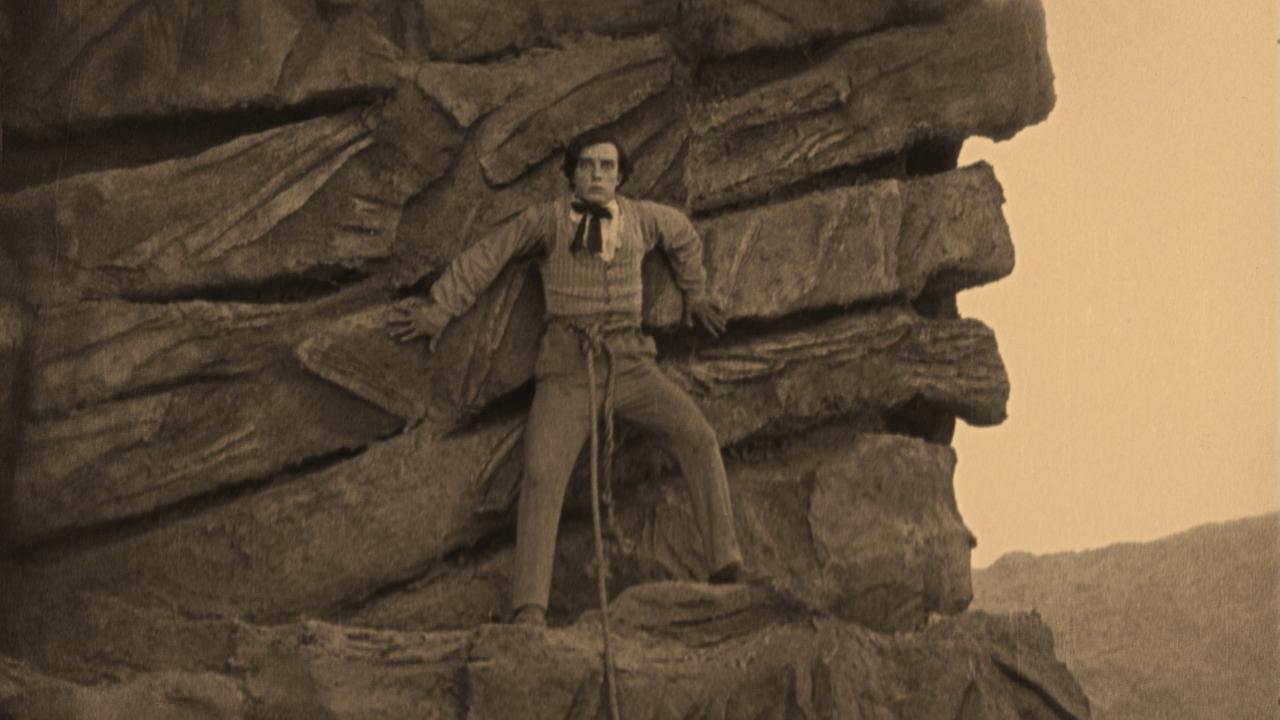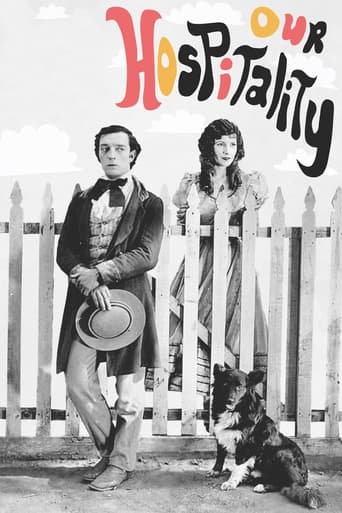

It's about 1810. The Canfields and the McKays are feuding clans. John McKay is killed and his wife moves with her infant son Willie to NYC to live with her sister. After his mother's death, Willie (Buster Keaton) is raised by his aunt without any knowledge of the feud. He returns to Rockville to reclaim his inheritance. He meets Virginia Canfield (Natalie Talmadge, Buster's real-life wife) on the train. She invites him over as her family keeps trying to kill him.The rickety old train is fascinating and extremely cool. The story is fun. The family trying to kill him is pretty funny especially when he figures it out. Keaton being scared is hilarious. There are some good stunts. There are some that seem much more dangerous than exciting. Then there is the waterfall dumping on him. The rock climbing looks scary especially when they're not on a set. There is a terrific waterfall rescue at the end that is more in line with an expert trapeze act. The movie has some fun and lots of stunts which is the hallmark of Keaton.
... View More"Our Hospitality" isn't Buster Keaton's greatest film, but shows a young pioneer on his way.As Willie McKay, Buster inherits a family estate down South circa 1830. To stake his claim, Willie must survive two things: 1. A ride on the "iron monster" which chugs ungently across hilly terrain. 2. The "hospitality" of the rival Canfield clan who wants to send an unwary Willie to the boneyard with the rest of the McKays.Watching Buster riding a train down South immediately conjures up thoughts of his later "The General," and there are plenty of other signposts for Buster fans. After finding himself unable to wear his foppish top hat in a coach with a low ceiling, Buster shifts to more practical headgear: his trademark porkpie, which remains with him thereafter. He's even joined this one time by his real-life wife Natalie Talmadge, who plays a young woman smitten with Willie to both their perils.I was prepared to not like Talmadge, as she didn't have much of a career in movies other than making misery of Buster's private and professional life later on. But she's quite affecting here. Keaton and co-director Joseph Blystone do a lot to draw out a naturally reticent quality in Talmadge; she and Buster work well together at least here.The opening section features a very serious, overplayed dramatic "prologue" that isn't really needed and puts things on the wrong footing tone-wise. Buster gets a lot of mileage from his clattering train prop, but overuses the same gags. A big stunt at the end involving a waterfall, while jawdropping, lacks the comic underpinnings typically found with Keaton. It could be something out of "Perils Of Pauline."Most critically, the pacing is off. There are many good gags and funny bits of business, but the set-ups take too long. I'm still amused watching the third straight slow-loading flintlock gag in as many minutes, and that's something, but you so often get more from Buster.Keaton's genius shines through in many places, though, particularly at the Canfield house where he is the unwelcome guest of his would-be killers. They operate under a strict code of honor that won't let them shoot a guest (though the same code apparently says nothing about shooting an unwary victim in the back). Watching Willie work every angle he can think of to stay a guest is Keaton in prime form, whether presenting a series of really bad dog tricks or dressing as a woman.And there are some stunts as funny as they are awesome, like one where Willie is actually "rescued" by one of the Canfields on a steep cliff, and the two men wind up tied to one another as killer and prey. The period comedy is good, too; like an early shot of Broadway and 42nd Street in Manhattan's cowtown days, when Willie sits a bicycle watching a lone wagon pass by: "This is getting' to be a dangerous crossin'!"There's enough of that to make "Our Hospitality" good fun, and the stunt work, however off tonally, remains amazing even today. If it's not as great as other Buster comedies, it's Buster's own fault for making his later work so much better than this.
... View MoreThis was seen in the annual Kansas Silent Film Festival. It stars Buster Keaton and is a take-off on the famed Hatfield-McCoy feud, with those names altered to "Canfield" & "McKay."The plot has Willie McKay (Keaton) being taken north and raised in NY state after his father is killed in the feud. When he becomes a young adult, he's tricked into returning to inherit his father's estate (unaware that it's practically non-existent) and where he'll inevitably run into the wealthy Canfield family who have the intent to murder him.BUT also on his train journey back is a lovely young lady -- a Canfield as it happens -- who invites Willie to supper in her home with her father and 2 brothers. Because of the customs of Southern hospitality, her father forbids his sons to kill Willie in their home, so they try tricks to get him outside. A very funny movie with many surprises. (Keaton loved trains and had "The Rocket" built especially for this film.)
... View MoreOne of the least revived of Buster Keaton's classic silent comedies is also one of his best: a typically graceful and hilarious parody of the legendary Hatfield-McCoy feud, which not only provides the expected thrills and belly laughs (the two often coincided, for example during the climactic waterfall rescue), but also recreates, with remarkable fidelity, the early 19th century American frontier (south of New Jersey). As in the best silent comedies the plot is little more than an outline, with Buster playing an unwitting Northern ancestor reclaiming an old family rivalry alongside his paltry inheritance. But the film is rich in comic detail and invention, with a remarkable sophisticated structure for its time, beginning with a stark dramatic prologue to set up the characters (Buster as a child is played by the actor's own infant son). What follows is a long, leisurely, nostalgic journey through the Shenandoah Valley aboard an antique DeWitt-Clinton prototype locomotive, actually no more than a stagecoach on rails (and donated after filming to the Smithsonian Institute). Throughout his career Keaton insisted he only wanted to make people laugh, but his comedies can be enjoyed just as easily for their style and technique, and this film in retrospect reasserts Keaton's position (in only his second feature) as not just another talented clown, but a truly gifted filmmaker.
... View More